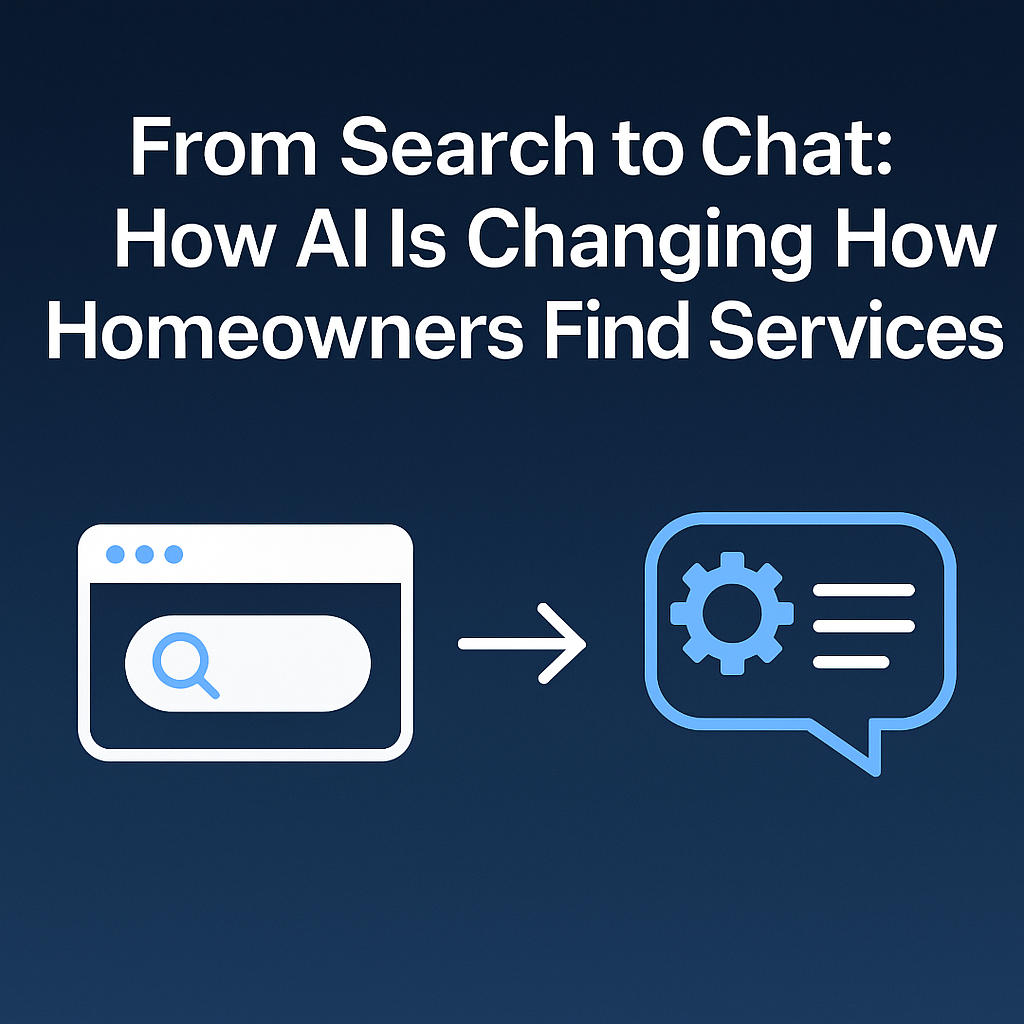The Big Picture
- AI chat is growing fast: AI-powered search tools now account for ~5.6% of U.S. desktop search traffic — doubling in the past year — while Google still controls the vast majority【1】.
- User behavior is shifting: Studies show people increasingly turn to AI for complex, multi-step tasks like troubleshooting or planning projects, not just fact-finding【2】.
- Why it matters: These moments often lead directly to a referral for a home service provider, which means AI is starting to shape who gets the call.

Homeowners Are Changing How They Search
Homeowners are beginning to change how they search for help. Instead of going straight to Google to type “plumber near me,” many are now turning to chat-based tools like ChatGPT, Perplexity, and Microsoft Copilot. These AI platforms aren’t just answering questions — they’re starting to recommend local businesses.
While Google remains dominant (still generating 379 clicks to publisher sites for every one from ChatGPT【3】), AI usage is growing rapidly. According to the Wall Street Journal, AI-driven search captured 5.6% of desktop search traffic in mid-2025, up from just 2–3% a year earlier【1】. And research from Nielsen Norman Group shows users lean on AI as a “shortcut” for knowledge-intensive, multi-step tasks【2】 — exactly the type of situations where home service needs often begin.
For home service companies, this is a major shift.
The Scenarios We’re Seeing
While search engines still dominate when someone has a clear need (like “find an HVAC company near me”), AI tools are showing up earlier in the decision-making journey — at moments where the homeowner doesn’t yet know which service to search for.
We see three common patterns:
Direct service intent
- “Plumber near me” or “electrician in Washington, DC”
- Search engines still rule here with ads, local pack, and maps.
Symptom triage → escalation
- “My thermostat just stopped working.”
- “Water is pooling in my basement.”
- AI tools are strong at walking a homeowner through some basic steps and then suggesting they call a professional when the problem goes beyond DIY.
Project planning and budgeting
- “I want to remodel my bathroom.”
- “How much does it cost to replace an HVAC system in 2025?”
- These are big-picture questions where the homeowner doesn’t know what type of contractor to search for — and AI is stepping in to connect goals with service categories.
Why This Matters for Home Service Businesses
If a homeowner’s first step is no longer a Google search, then the path to winning that lead changes. AI may recommend a directory (like Yelp or Angi), a franchise, or sometimes a local provider. Understanding where your business appears in this new discovery process will matter just as much as showing up in traditional search results.
Our Longitudinal Study
To better understand this shift, we’ve launched a longitudinal study that will test how the leading AI platforms (ChatGPT, Claude, Windows Copilot, Perplexity, and Grok) recommend home service businesses compared to search engines (Google Search, Bing Search, Google Maps, and Bing Maps).
We’ll run structured scenarios — from “plumber near me” to “my dishwasher is leaking” to “I want to remodel my basement” — and track which businesses, directories, or service categories are recommended.
This isn’t a one-time snapshot. We’ll be repeating these tests regularly over the coming months, as AI platforms evolve and new versions are released.
What’s Next
On our Labs blog, we’ll be sharing high-level findings from this study — including patterns, shifts over time, and takeaways for the home services industry. On this marketing blog, we’ll distill those findings into practical recommendations you can act on: how to position your business for visibility in both search and AI.
The bottom line: homeowners are changing how they find help. Search engines still matter, but AI is increasingly shaping the journey — and we want to make sure your business doesn’t get left behind.
